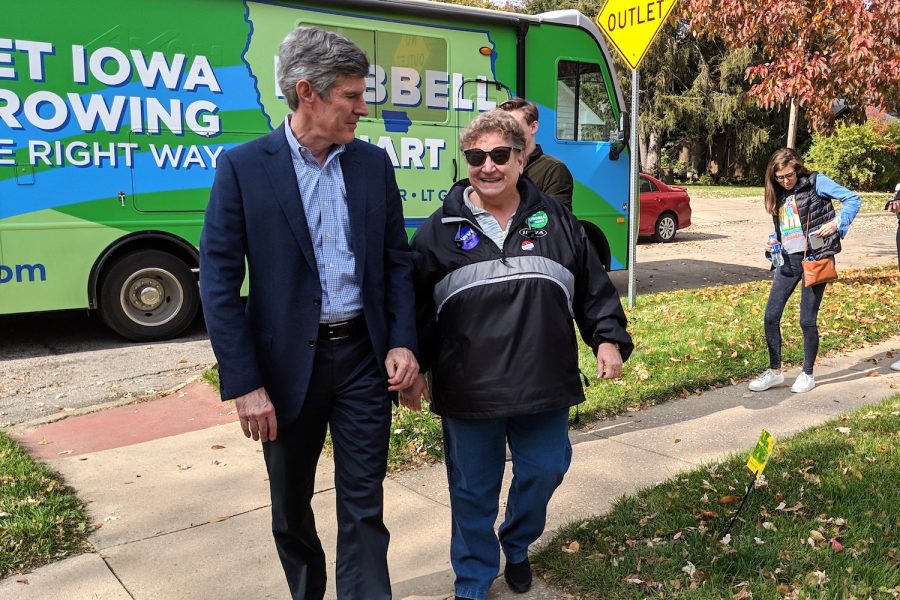Hubbell ‘optimistic’ ahead of Election Day as candidates for governor ramp up campaign stops
On Nov. 6, voters will decide who will be the next chief executive of the state of Iowa. In several stops in Johnson County, Democrat Fred Hubbell rallies voters.
Democratic candidate for governor Fred Hubbell stops by a canvassing event in Iowa City on Oct. 27. Walking with him is Iowa representative Mary Mascher, of Iowa City.
October 27, 2018
Democratic gubernatorial candidate Fred Hubbell and Johnson County Democrats say they are “optimistic” heading into the final stretch before Election Day.
With just 10 days left to go before Nov. 6, retired Democratic businessman Hubbell and Republican Gov. Kim Reynolds have scurried across the state in campaign buses in last-minute stops to reach voters and volunteers.
In a few visits to Johnson County on Oct. 27, Hubbell continued his issue-based speeches that has been central to his campaign for governor. On the lawn of a local Democratic organizer’s house, he pledged to reverse privatized Medicaid, strengthen collective-bargaining rights, raise the minimum wage, increase funding to educational institutions such as the University of Iowa, and continue IPERS.
“Let’s put people first again,” Hubbell said. “We have a big choice ahead of us. We could just have a third Branstad term with more of the same with Gov. Reynolds — less education funding, less support for health care, less support around the state for our communities or we could change, change the direction of our state, put people first again.”
He began the stop with a moment of silence for Kurt Friese, a Johnson County supervisor who died Oct. 27.
Hubbell headed to Scott County later and will make stops in another four counties on Oct. 28.
Before Hubbell arrived at the event Oct. 27, University of Iowa student Lee Sailor, 26, said he was “pleasantly surprised” by Hubbell; he had voted for John Norris in the Democratic primary in June.
He said he stood firmly with Hubbell because of his aggressive stance to return Medicaid decision-making to the state government. Medicaid is Iowa’s insurance program that primarily serves people with disabilities and low-income individuals. In 2017, the state began relegating patient decisions to for-profit insurance companies.
RELATED: Reynolds stops in Iowa City to tell voters Iowa is moving in the right direction
Sailor is one of approximately 680,000 Iowans insured by the state’s insurance system. He said he especially became concerned a year ago when one of the three for-profit insurance companies running Medicaid announced it would pull out of contracts with the state. Although he wasn’t insured under the company, Amerihealth, and remained healthy, he said he was concerned about his company possibly pulling the rug out from under his feet.
“My top priority is getting the Medicaid system in Iowa straightened out,” he said.
Another Johnson County Democrat said he supported Hubbell because he supported collective-bargaining rights. He also emphasized he thought a vote for Reynolds was a vote for someone who supported Trump.
“Every Republican running who has not been vocal regarding the Trump administration is an enabler,” said Stan Miller, 71. “By their silence or enabling, they are complicit.”
Hubbell’s opponent, Reynolds, took over the governorship in 2017 when her predecessor, Terry Branstad, was appointed to be the U.S. ambassador to China.
She visited Hamburg Inn No. 2 on Oct. 25 as part of her bus tour around the state. There, she told reporters she was “feeling good” about her standing in the race for the governor’s office, citing a $127 million state budget surplus and lowered taxes as a reflection on her job performance. Often, she’s pointed to Hubbell as a candidate who would raise taxes.
However, Hubbell said at the Oct. 27 event he had no intention to raise taxes.
“No, it’s not true; the reality is we can fix Medicaid and stop this privatization disaster without raising taxes,” he said. “She’s sent $100 million out of state, and costs are rising faster than they were before. We are paying 12 to 15 percent to for-profit companies that used to cost 4 to 5 percent. If we are smarter about what we do there, I think we can focus on the quality of outcomes for people. I think we can stay within the costs that we already have.”
Hubbell expressed optimism, too, in flipping the Legislature blue. Currently, both chambers in Des Moines have Republican majorities.
“We’ve got a wonderful ticket up and down and sideways across the state. We are working hard to get everyone elected we can,” Hubbell said. “We want Mary Mascher to be in the majority, not the minority … Historically, the better the statewide races go, the more likely the House, and potentially the Senate, could go in our direction.”



